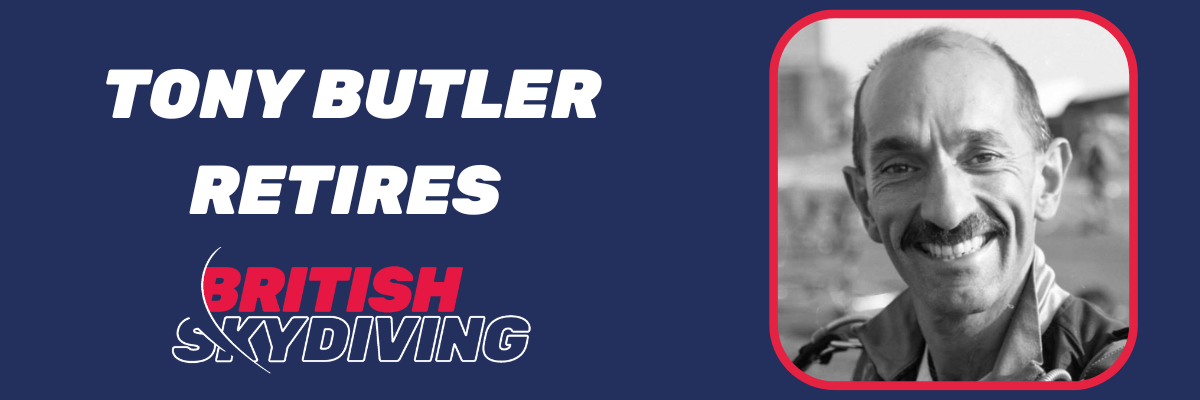Tony Butler retired as British Skydiving’s Chief Operating Officer on the 31st of August after 40 years of working for the Association. The staff at HQ had the pleasure of sending Tony off with a retirement lunch, including a sash, which Tony begrudgingly wore the entire time!
In honour of his service, the board have nominated Tony to be a Vice President.
It is hard to express all the hard work Tony has done for the association over the last 40 years, and we are incredibly thankful for his dedicated service to the sport, and the association.
🪂 How did it all start? 🪂When I was a young kid I saw an American TV series called Ripcord which revolved around skydiving. However, I did not know if anyone skydived in the UK and I thought parachuting was just for soldiers. Later, I discovered that there was a parachute club at Shobdon, near Hereford, and I booked a static line course. I used to look at other students on the flight line, none of them looking scared, and thinking I must be the only one who was petrified, not knowing at the time that they all felt the same. I started jumping ex-military surplus round parachutes, with very hard landings, which I was no good at, breaking my leg on my sixth and fifteenth jumps!
🪂 What sort of jumping have you done? 🪂
All sorts, but my love was always FS, spending many years jumping on 4-way and 8-way teams, winning the odd medal along the way. In the late ’70s I got into CF (CRW in those days), and joined a team in California called Perris CReW. We did hundreds of CF formations before any were included in competitions; most had never been tried before. However, those early days usually ended with entanglements and cutaways most weekends!
🪂 What has been your most memorable jump or skydiving experience so far? 🪂
Probably being on the 126-way World Record in Belgium in 1987, the first time the FS World Record had ever taken place outside of the USA. It was broadcast live (on radio!!) in Belgium, most of us landed out, and the locals came out of their homes to drive us back to the airfield. I’ve also had memorable jumps in Thailand (80-way Asian record 1989), Russia (jumping a Mil Mi-26 helicopter – larger than a Hercules), Poland, Cuba, Switzerland and Mauritius. The jump in Mauritius was the first ever jump on the island. Had to get permission from the Prime Minister!
🪂 How did you end up working for the BPA? What jobs have you done since starting here? 🪂
To a certain extent it was being in the right place at the right time. A previous National Coach and Safety Officer (NCSO) left after a short time with the Association, and the then-Chair Jim Crocker asked me if I would cover until they advertised the position. The Council at that time decided they needed two people to carry out the job, and I ended up getting one position and John Hitchen the other. We then became Joint National Coaches & Safety Officers. We even had to share one salary for many years. I continued to work with John for the next 30 years. After about 20 years John continued as NCSO and I became Technical Officer, continuing to work on safety with John, but also working with the Secretary General, Martin Shuttleworth. This involved dealing with outside agencies such as the CAA, other sports associations and our insurers. Finally, about 10 years ago I became Chief Operating Officer (COO), still carrying out my previous responsibilities, but also taking responsibility for the day to day running of the Association.
🪂 What have been the biggest changes in your time? 🪂
There have been massive changes. When I started there were really only two skydiving disciplines; ‘Style & Accuracy’ and ‘Relative Work’ (FS), not all the various disciplines we have now. All students had to train via static line jumps, and Tandem was still some way off. The most common aircraft in the UK were small Cessnas (172, 182, 206), no turbines. The sport wasn’t as commercialised as it is now, mainly small weekend clubs. What are you most proud of? I hope that my work on the safety aspects of the sport have helped keep us all a bit safer. I believe our safety record has made us one of the most respected associations in the world. I am proud to be the first person to qualify as an AFF Instructor in the UK, in 1984, and also the first to get a Tandem rating in the UK, in 1985. Both AFF and Tandem have come a long way since then. I’m also very proud of the hundreds of students I’ve helped train and coach over the years, who have gone on to be coaches and instructors themselves, some of whom have represented this country at various world championships, and members whose lives have changed by being part of the most exciting sport imaginable.
🪂 Who has influenced and inspired you most in the sport? 🪂
Many, many people have influenced me, from my early Instructors, such as Dean Fisher, who is still instructing after 50 years and has never lost his enthusiasm. The unsung heroes who have kept us in the air by fighting battles on our behalf, such as Tony Knight, who has probably done more than anyone else winning those battles. Many others, to name a few: John Hitchen, a legend; John Carter, our medical adviser for over 25 years; John Lines, and that’s just the Johns!
🪂 What advice would you give to anyone who wants to improve British Skydiving, and how can members help? 🪂
Remember we are a members’ association, and what the members want is to be able to jump as safely as possible, as often as possible, and as cheaply as possible. The membership can help by volunteering where they can, and encouraging more students to stay in the sport – include them so that they don’t feel isolated. Be ambassadors for the sport at every opportunity.
🪂 What’s next? 🪂
A slightly quieter life (less politics). Still involved with skydiving, some jumping, volunteering. Telling old jump stories around the fire.
🪂 Any final words? 🪂
Proud to be part of such a brilliant skydiving family. The best friends I’ve made have mostly been skydivers, and I’d do (most of) it all over again.







